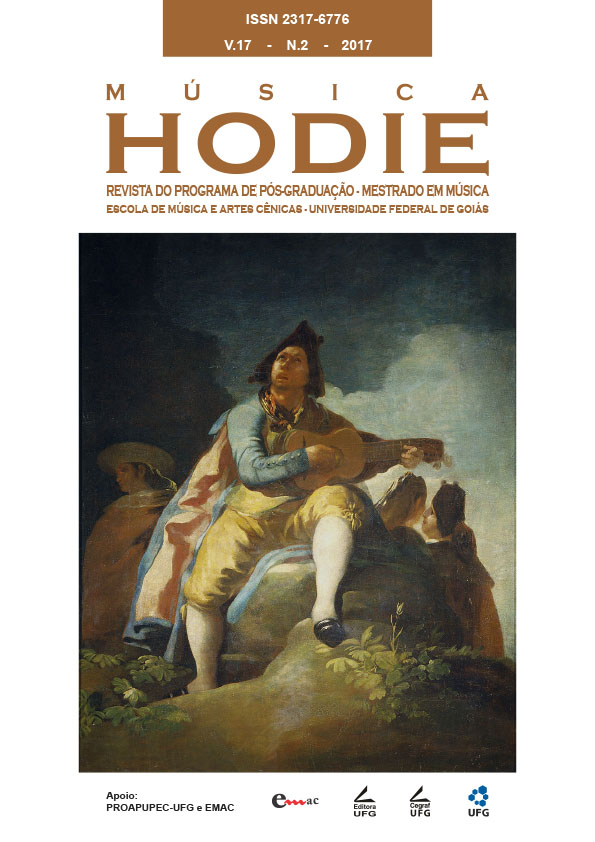How classical music is embedded in a cultural public sphere?
DOI:
https://doi.org/10.5216/mh.v17i2.46860Keywords:
Classical music, Cultural public sphere, HabermasAbstract
Classical music as a special form of culture has been widely defined within an ideological and social sphere in people’s everyday life. A particular form of power structure has encouraged individual musicians or music events organisers to re-think the relationship between the governmental structure and individual agencies within the local music sphere. It has become clear that musical exercise is not simply invented by individual musicians or individual music organisations, but through their political cultural sphere and through society. This paper discusses the nature of democracy over classical music and explores classical music in the context of cultural public sphere by theoretically reflecting the notion of public sphere by Habermas, and argues that the policy for classical music is all about bringing democracy to the local public, but, on the other hand, the local public still have concerns on whether local government really takes the necessary steps to make democracy widely available for all forms of music organisations and for everybody in the cultural sphere. The papers also discusses how the culture democracy exercise at a local music level, and explores that music education policy system together with an effective musical education curriculum should also play a positive role in addressing such concerns.
Downloads
References
Adorno, T.W. and Horkheimer, M (1979) The Culture Industry: Enlightenment as Mass Deception, Dialectic of Enlightenment. London: Verso.
Bennett, T. (1998) Culture: A Reformer's Science. London: Sage.
Bourdieu, P. (1984) Distinction: A Social Critique of the Judgement of Taste. London: Routledge.
Bourdieu, P. (1986) The forms of capital, in: John G. Richardson (ed.), Handbook of Theory and Research for the Sociology of Education. New York: Greenwood Press.
Danaher, G., Schirato, T and Webb, J. (2000) Understanding Foucault. London: Sage.
Elliott, J.D. (1989) Key Concepts in Multicultural Music Education. International Journal of Music Education, 13: 11-18.
Everitt, A. (1997) Join in: an Investigation into Participatory Music. London: Calouste Gullenkian Foundation.
Foucault, M. (1976) The History of Sexuality: Volume I: The Will to knowledge, London: Penguin.
Garnham, N. (1990) Capitalism and Communication-Global Culture and Economics of Information.
London: Sage.
Habermas, J. (1991) The Structural Transformation of the Public Sphere. Massachusetts: MIT Press.
Hargreaves, D.J., Marshall, N. & North, A.C. (2003) Music education in the 21st Century: a Psychological Perspective. British Journal of Music Education, 20(2), 147-163.
Hewison, R. (1987) The Heritage Industry-Britain in a Climate of Decline. London: Methuen.
Hoggart, R. (1995) The Live we Live now. London: Chatto and Windus.
Johnson, J. (2002) Who needs Classical music? Culture Choice and Musical Value. Oxford: Oxford University Press.
Jenkins, R. (1992) Pierre Bourdieu. London: Routledge.
Keith, M. and Pile, S. (1993) Place and the politics of identity. London: Routledge.
McGuigan, J. (1996) Culture and the Public Sphere. London: Routledge.
McGuigan, J. (2004) Rethinking Cultural Policy. Milton Keynes: Open University Press.
McGuigan, J. (2006) Richard Hoggart: Public Intellectual, International Journal of Cultural Policy, 12(2): 199-208.
Pratte, R. (1979) Pluralism in Education: Conflict, Clarity and Commitment. Springfield: Charles C. Thomas.
Reay, D. (2004) Education and Cultural Capital: The Implications of Changing Trends in Education Policies, Cultural Trends, 13(2): 73-86
Tomlinson, S. (2001) Education Policy, 1997-2000: the effects on top, bottom and middle England, International Studies in Sociology of Education, 11(3): 261.
Williams, R. (1976) Keywords: A Vocabulary of Culture and Society. London: Fontana.















